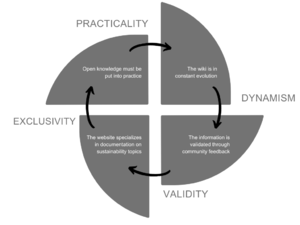
In relation to the research objective which sought to present Appropedia as an open knowledge website where development-promoting organizations in El Salvador could showcase the results of their learning processes, the following question was posed during the interview phase:
- Based on your experience using the platform, why do you consider Appropedia to be the ideal wiki for making your organization's learning process results visible?
The results of this inquiry revealed a series of attributes of the platform, as shown in figure 3.
Appropedia stands out for its practicality, dynamism, exclusivity, and validity in documenting innovative solutions related to Sustainable Development. Firstly, practicality is a distinctive element of the platform, as unlike an encyclopedia, this wiki is not a static repository of information but a tool designed to put all documented content into practice. This allows knowledge to be turned into action, promoting the exchange of experiences and best practices among development organizations. This application-focused approach can be illustrated through the ''Tolocar''[1] project, where dynamic initiatives in Sustainable Development led by innovators around the world have been documented to be replicated by communities in Ukraine.
This dynamism manifested by the platform through evolutionary logic is another essential characteristic. Appropedia is constantly evolving, adjusting its organizational structure to meet the needs of its user community and the new trends demanded by the sustainability ecosystem.
The third attribute is exclusivity, as this platform specializes in providing documentation on sustainability, offering solutions that help communities find alternatives for achieving more sustainable lives. This purpose makes it an essential website for organizations interested in contributing to a more sustainable world. In this sense, the platform's basic component is experiential and linked to a technical component that ensures the website's proper functioning. For example, on Appropedia, a tool used for classifying development projects is categorization by SDGs, allowing users to search for information related to a research area based on a specific goal.
Lastly, regarding the validity and accuracy of the information documented on Appropedia, this is reflected through its user community composed of organizations, universities, researchers, innovators, students, among others. These actors provide feedback that can be found at the end of each available page on the wiki. These spaces within the platform are known as ''talk pages'',[2] and they enable discussions among users about how to improve a page on the wiki, facilitating the exchange of best practices and the creation of solutions jointly by entities and individuals interested in preserving valuable resources for Sustainable Development.
It is important to note that the wiki does not have an established method for measuring the rigor of the available content because it is understood that it is important to give users the freedom to document the information they deem relevant. This represents a challenge because the content available on a project's pages may be insufficient. For a better understanding, an example of this could be a situation where a user wants to replicate a prototype, such as a solar cooker,[3] found on the wiki. This would become a complicated task if the information is not described in detail or presents inconsistencies in showing the relevant construction instructions.
The Appropedia Foundation considers that the standards of accuracy for documentation are the responsibility of each user, whether an individual or an entity, who edits the wiki. However, to avoid projects with incomplete documentation or lacking bibliographic weight, it has provided users with various templates that allow people to provide more specific information about the status of a project. For example, a widely used tool within the platform for categorizing the content available in documented development projects is the ''Project Data''[4] template. This template includes data related to the author's name, location, status (whether it is an idea, prototype, design, among others), if the project is replicated by other organizations, among other elements.
- ↑ "Tolocar," Appropedia, accessed October 21, 2023, Tolocar
- ↑ Yaron Koren, Working with MediaWiki (United States: WikiWorks Press, 2012), 45
- ↑ "Solar Cooker," Appropedia, accessed January 31, 2024, Solar cooker
- ↑ “Template:Project Data”, Appropedia, accessed October 9, 2023, Template:Project data